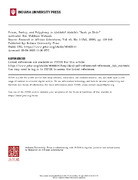| dc.contributor.author | Walibora, Ken Waliaula | |
| dc.date.accessioned | 2020-04-20T11:47:26Z | |
| dc.date.available | 2020-04-20T11:47:26Z | |
| dc.date.issued | 2009 | |
| dc.identifier.citation | Vol. 40, No. 3 (Fall, 2009), pp. 129-148 | en_US |
| dc.identifier.uri | https://www.jstor.org/stable/40468141 | |
| dc.identifier.uri | https://www.jstor.org/stable/40468141?seq=1&cid=pdf-reference#references_tab_contents | |
| dc.identifier.uri | http://erepository.kibu.ac.ke/handle/123456789/1887 | |
| dc.description.abstract | This article is a study of the prison poetry of Abdilatif Abdalla, one of the most talented twentieth-century Swahili poets. Abdalla penned his col lection of poems Sauti ya Dhiki while serving a prison term for sedition during the Jomo Kenyatta regime in postindependence Kenya. Prison as a site for writing had tremendous influence on the form and content of his poetical productions. In this regard I suggest that, for the most part, the terribly unpleasant prison conditions that the poet experienced, enabled, and enhanced the occurrence in his poetry of a psychic or philosophical journey, which may or may not have been therapeutic, and the articula tion of a whole range of 'Voices/' I undertake a close reading of Sauti ya Dhiki, exploring the symbolic journey and the polyphony that characterizes Abdalla's reaction to his incarceration by what Achille Mbembe would call the "postcolonial potentate | en_US |
| dc.language.iso | en | en_US |
| dc.publisher | Indiana University Press | en_US |
| dc.rights | Attribution-NonCommercial-ShareAlike 3.0 United States | * |
| dc.rights.uri | http://creativecommons.org/licenses/by-nc-sa/3.0/us/ | * |
| dc.title | Prison, poetry, and polyphony in Abdilatif Abdallah Santi ya Dhiki | en_US |
| dc.type | Other | en_US |

